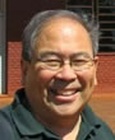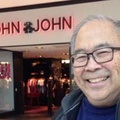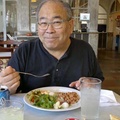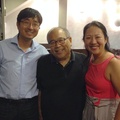July 16, 1994. We were in São Paulo, Brazil. We being, Curt, Grace, Chris, Ruth, Albert, Darin, and me. Some 7,900 miles away, at the Rose Bowl in Pasadena, an event was in progress that would rock our world. The event was the final of the World Cup Soccer game.
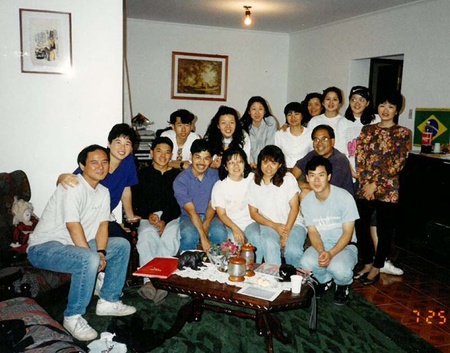
John, pictured behind guy in first row on the right, with the North American team and Brazilian friends in 1994.
I must say that having watched my son Brandon play soccer in the West Covina soccer league gave me an understanding and appreciation for the game. Watching the television in my small rented apartment in Bosque da Saúde, I found myself explaining the game to my Californian co-workers.
The game was scoreless after two overtimes and the match would go into the shootout phase. Each team would take five shots and the team with the most shots in goal would be declared the winner. Before giving you the result, I have a couple of observations.
1. Americans know little or nothing about soccer. I’m actually okay with that. Coming from LA, I have room for the Lakers, the Dodgers (but not the Angels—who turned in a sparkling, heart-stopping performance to become baseball’s 2002 World Champions), and in 1994, both the Raiders and the Rams were still in town. In such a sports mecca, it’s hard to fit in soccer, though I did manage to see a number of my son’s games.
2. The world calls soccer “football,” or in Brazil, “futebol.” It’s pronounced “fooch ball.” The World Cup, unlike the World Series, is truly a world event.
Our American pastime has a somewhat narrow perspective of what constitutes the world. Major League Baseball includes teams from the USA and a couple of Canadian teams. But the “World” Series doesn’t include Latin America. Nor Asia. In contrast, futebol is an international phenomenon. Countries like Turkey and Bulgaria send their country’s best team to the World Cup. The international nature of the WC was seen in 2002 when two minor soccer countries, Japan and Korea, hosted the World Cup.
3. It’s about national pride. We see this in the US during the Olympics, when crowds chant, “USA! USA!” But our team sports like basketball or football are about cities or universities, be it LA, Pittsburgh, USC. It’s about local bragging rights. In contrast, the World Cup is the chance for an entire nation to swell their collective chests with pride. National honor as well as national ego either stands or falls on the results of the World Cup tournament.
So back to my apartment in Bosque da Saúde, I sit with my American teammates watching the final shootout between Italy and Brazil. The score is tied 0-0 when Brazil breaks the tie with a gooooaaalllll! (Yeah, Brazil does that too) The final of the shootout was three goals to two. Brazil won their fourth world championship!!!
As we sat in the living room, we sensed the city of São Paulo coming to life in a hurry. There were fireworks being set off, the sound of explosions, yelling, and a general hubbub in the streets. We all came to the same conclusion that we didn’t want to sit inside on such a momentous national occasion. We decided to head down to the centro (city center).
Walking to the metro station at Praça da Árvore was an experience as we saw our entire neighborhood turned out into the streets. We saw overcrowded city buses go by with people hanging from the doors and out of the windows, screaming at the top of their lungs. We boarded the metrô to head into the city center. After we passed several stations, we decided that it was time to get off for our own safety. Exuberant fans had boarded the metrô and were rocking the entire train side-to-side. The São Paulo metrô system is state-of-the-art technology, but I wasn’t sure that it had been tested for a World Cup victory!!
What an experience! It was an in-country moment that wouldn’t be repeated for me.
In 1998, I was in São Paulo as Brazil played flat-footed in the final game against France, losing 3-0. I was in the home of the Takada family in a district called Saúde. You could feel the disappointment descending on the home and the entire city.
In 2002, when Brazil beat Germany 2-0 in the final to win an unprecedented fifth world championship, I was asleep, letting my VCR record the game. I would watch the videotape of the final the next day from my bedroom in Monterey Park.
Now that I think back, to have been in Brazil on the very day that they won the World Cup was a special experience.
Likely once-in-a-lifetime.
© 2014 John Katagi


